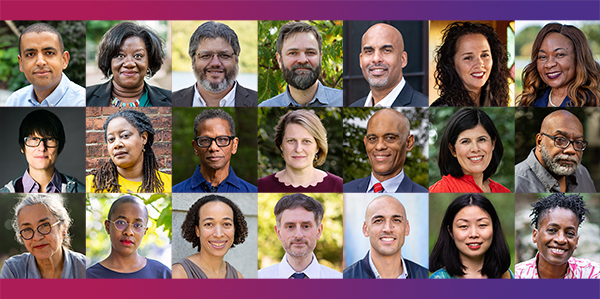Marlies Carruth, Director of MacArthur Fellows, discusses the participatory-by-design practice the Fellows program embodies and the importance of collaboration and trust in inspiring creativity.
Increasingly, artistic installations and performance, historical scholarship, scientific research, and other creative initiatives are engaging new networks and community members outside of the academy and outside of traditional cohorts of practice in the production of their work. This modality, participatory-by-design, is producing creative work and innovative solutions. It is challenging trust-based philanthropy to trust not only the grantee, but the extended networks activated by the grantee as well.
It is an evolution of process that is exciting to see.
Trust-based philanthropy has been a feature of the awards to MacArthur Fellows from the program’s earliest days. The purpose of the Fellows program is to identify individuals who demonstrate extraordinary creativity across all endeavors and to support them with grants (which lasts for five years) and access to a community of other innovators (which lasts forever). The award is to individuals and comes with “no strings attached.” With these parameters, MacArthur is communicating that we trust individuals to determine what will best support their work and their potential to make a difference in the lives of others.
Our participatory-by-design process engages nominators, evaluators, and a multi-disciplinary advisory committee to identify, recommend, and evaluate each year’s class of MacArthur Fellows. So that our process is informed by the widest range of perspectives possible each year, we are constantly reaching out to new participants and new areas of practice. We value the power of these expansive affiliations because they have yielded exceptional results.
Increasingly, we see that Fellows, and other MacArthur grantees, are advancing fields by working collaboratively, rather than as sole author/artist/inventor. Beyond collaborations, this broad inclusion uncovers more hidden assets, harnesses more potential, draws on more diverse forms of knowledge, and can be more foundational and transformational than solitary modes of operating and creating.
The MacArthur Fellows class of 2022 reflects the work of Fellows hailing from different fields of practice. Yet, many shared a common approach of intentionally enlisting others (from the handfuls to the hundreds) to address problems that cannot be solved by one or a few individuals, in fields one might not expect. Emily Wang practices the participatory-by-design modality in partnerships with community health workers to deliver transitional clinical health services for the formerly incarcerated. Gabrielle Foreman practices participatory design in collaborative digital humanities scholarship that recovers early traditions of African American activism. Amanda Williams practices participatory design in artistic interventions that question how economic, cultural, and aesthetic value of an object or community is determined. Jenna Jambeck practices participatory design in mitigating plastic waste through community data gathering. And Moriba Jah practices the participatory-by-design modality in recruiting others from around the world to help gather data to enable scientists to deconflict man-made orbital bodies in low Earth orbit.
This engagement and inclusivity are both intentional and indispensable to the creation of inspiring art and transformative humanistic understanding.
Often these legions of on-the-ground partners go unnamed in the production of catalytic work and transformative undertakings. Members of these communities may not receive award money; they generally are not individually named as collaborators. But their value to the final mission is undeniable. They extend the reach of the creation and the investment beyond any traditional product of the academy, like one paper or presentation.
It is my hope that these partners understand the value they bring to societal progress and that they are inspired by the creation of new work that reflects their voices. The result: a shared landscape that is forever changed.
In trusting these partners, our Fellows are honoring community assets that have been long overlooked. In trusting not only individuals in familiar orbits, but also strangers in extended communities, the Fellow understandably yields some control. However, the benefit is so much greater.
Refreshing both artistic and social science practices, as well as engineering and science, this paradigm hints at a new, formidable tool of knowledge production and hidden history.
We applaud this trend. By supporting Fellows, who in turn support projects which recruit others, we give oxygen to the participatory-by-design modality in slow-to-change domains of practice. Whether in research and scholarship with the potential to advance science and engineering, social advocacy providing long overdue repair, or in inspiring artistic practice, we embrace this way of working because we see its success.
Some Fellows will best operate in a mode of sole authorship, suited to their personalities, the nature of their work, and their unique vision. Others will choose a different path. We need this diversity of approach.
The 2022 class of MacArthur Fellows remind us that we are all stewards of our communities and of our planet. In this stewardship role, we can participate as active partners—whether at the institutional or community level—supporting bold thinkers and doers who are charting new courses and reimagining boundaries.
Trust-based philanthropy remains our North Star, and we will continue to do it with each new class of MacArthur Fellows. Trustworthy networks are becoming familiar and effective partners in innovative work for Fellows and others. Trust-based philanthropy, that is participatory by design, is a thriving pillar of dynamic creativity.
MacArthur Fellows grantmaking ›
Other Director's Perspectives ›




